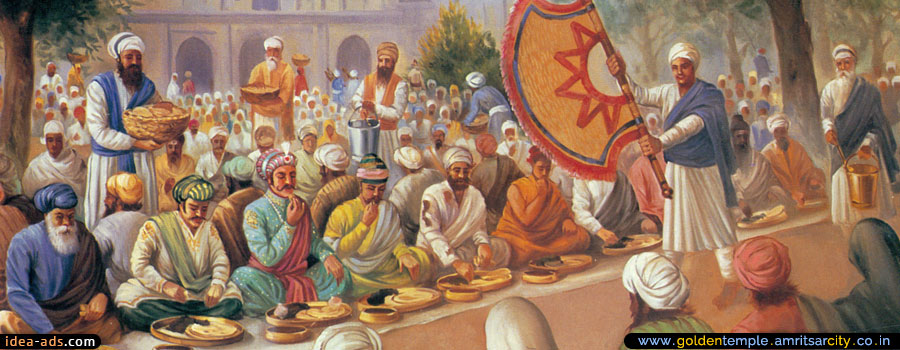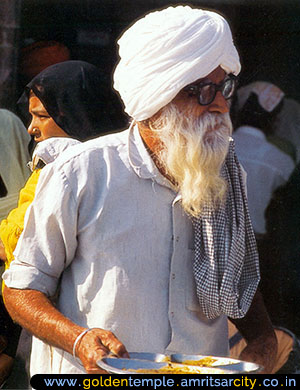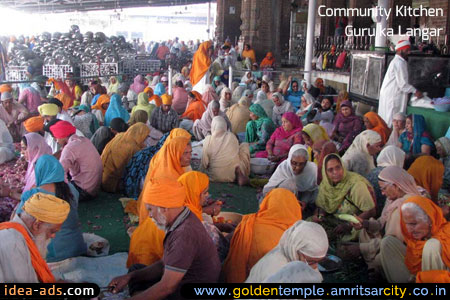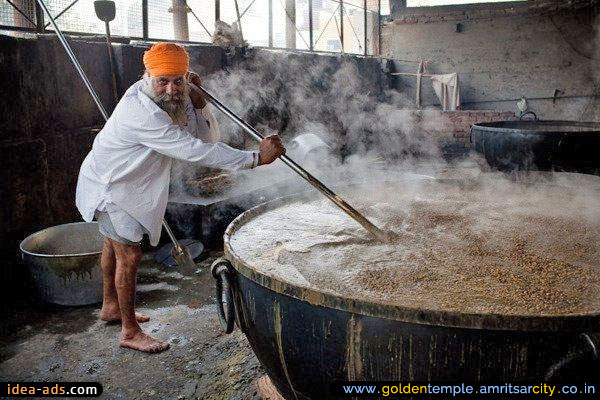Travel Guide to


In the Sri Darbar Sahib Amritsar (The Golden Temple Amritsar), Langar (community kitchen) at an average 75,000 devotees or tourists take langar in the Community Kitchen daily; but the number becomes almost double on special occasions. On average 100 Quintal Wheat Flour, 25 Quintal Cereals, 10 Quintal Rice, 5000 Ltr Milk, 10 Quintal Sugar, 5 Quintal Pure Ghee is used a day. Nearly 100 LPG Gas Cylinders are used to prepare the meals. 100’s of employees and devotees render their services to the kitchen.

Bhai Desa Singh in his Rehitnama says, "A Sikh (we can say, every person) who is 'well to do' must look to the needs of his poor neighbours. Whenever he meets a traveller or a pilgrim from a foreign country, he must serve him devotedly.

There are many memorable aspects of a Sikh Gurudwara program, but most first-time visitors are surprised and delighted by the wonderful food that is freely served to the congregation at the conclusion of every Gurudwara program. This serving of food is a long-standing tradition called, Langar (community kitchen) (the Guru’s Kitchen) and originated with the first Sikh guru, Guru Nanak Dev Ji around 1521. Perhaps it began when, as a boy, young Nanak would feed groups of traveling mystics as they traveled through the area around his home. Or perhaps it grew out of Guru Nanak’s experiences traveling far and wide during his four Udasis (extended spiritual journeys) – being on the road, vulnerable to the varying level of hospitality that were available in all the locations he visited. Established at a time in India when separation by caste was of the highest importance, the act of sitting together (Pangat) in the Langar (community kitchen) was a revolutionary idea. “That is the maryaadaa (discipline) of Langar (community kitchen) – that even a king and a beggar can sit together, serve and eat the same food, in the same way”. Today, it is still a powerful reminder of the equality of all people before God, regardless of birth, gender, faith or status.
Langar (community kitchen) The tradition of serving Langar (community kitchen) Initiated by Guru Nanak Dev Ji and then established by the 3rd Sikh Master Guru Amar Das at Goindwal.

Even the Mughal King Akbar came and sat among the ordinary people to share Langar (community kitchen).
The institution of Langar (community kitchen) has served the community in many ways. It has ensured the participation of women and children in a task of service for mankind. Women play an important role in the preparation of meals, and the children help in serving food to the pangat. Langar also teaches the etiquette of sitting and eating in a community situation, which has played a great part in upholding the virtue of sameness of all human beings; providing a welcome, secure and protected sanctuary.
Everyone is welcome to share the Langar (community kitchen); no one is turned away. Each week a family or several families volunteer to provide and prepare the Langar (community kitchen). This is very generous, as there may be several hundred people to feed, and caterers are not allowed. All the preparation, the cooking and the washing-up is done by volunteers and or by voluntary helpers (Sewadars).

Maharaja Ranjit Singh made grants of jagirs to Gurudwaras for the maintenance of Langar (community kitchen). Similar endowments were created by other Sikh rulers as well. Today, practically every Gurudwara has a langar supported by the community in general. In smaller Gurudwaras cooked food received from different households may comprise the Langar (community kitchen). In any case, no pilgrim or visitor will miss food at meal time in a Gurudwara. Sharing a common meal sitting in a pangat is for a Sikh is an act of piety. So is his participation in cooking or serving food in the langar and in cleaning the used dishes. The Sikh ideal of charity is essentially social in conception. A Sikh is under a religious obligation to contribute one-tenth of his earnings (daswand) for the welfare of the community. He must also contribute the service of his hands whenever he can, service rendered in a langar being the most meritorious.